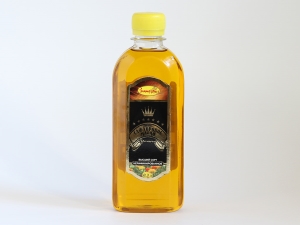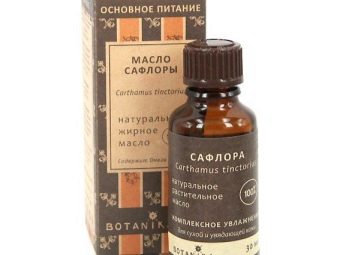Safflower oil: what is, properties and application

People discovered the beneficial properties of some crops for a long time, in the light of which they actively used plants for medicinal purposes, for cooking and in cosmetology. Among the huge list of such plants, safflower should be distinguished, namely oil obtained from this culture.
What it is?
The oil obtained from this southern plant is very easy to confuse with the product from the usual sunflower in the light of external similarity. However, it is made from the seeds of flowering culture - safflower. The product itself is notable for its light texture, making it easy to penetrate the dermis. And on the nutritional characteristics of the oil is comparable to the composition of olive.
Unique in its properties, the plant is cultivated in southern European countries. The seeds, which remain after the inflorescences, are collected and used for the manufacture of a plant product, the benefits to the body of which were discovered by the Egyptians.
In ancient times, the oil was used as a natural flavoring agent, the product acted as a dye, as well as a healing and fortified composition for human consumption.
Now the demand for plant composition fully justifies the benefit of using the product in cosmetology, medicine and cooking. Depending on the method of making the oil, its shade may vary from golden to greenish, and the unrefined product will be distinguished by specific organoleptic qualities along with the maximum concentration of useful properties.
On the shelves presented two types of safflower oil:
- the product consisting of 70% of oleic acid is sold in a refined and unrefined form;
- The composition of this oil includes 70% linoleic acid, which brings more benefits during use and consumption.
The shelf life of the first type of plant material is about one year. Most often, the product acts as a dressing for fresh salads or cold appetizers, however, in some cases it is included in the baking composition, as it does not lose the characteristics of the composition under the influence of high temperatures.
Safflower oil of the second type does not tolerate heat treatment, so it can be used exclusively in the fresh state. It does not stand out and a long shelf life - as a rule, it should not be stored for longer than five months.
Often on the shelves you can see the oil, which includes a few more ingredients, but in most cases this does not increase the beneficial properties of vegetable raw materials, therefore, it is best to opt for natural safflower oil without any additives.
Composition
The finished product, which is used in food, in a purified state is almost tasteless. However, in its chemical composition, it is distinguished by a rich fortified complex. First of all it concerns linoleic acid, which is an indispensable substance responsible for the work of the organism as a whole. The product also notes the presence of gamma-tocotrienol, whose properties make it possible to classify the substance as a highly effective means of protecting against damage to the cells of the body by radiation and cancer, preventing the development of cancer cells.
Among the list of acids that make up the oil, the following can be noted:
- myristic;
- palmitic;
- stearic;
- oleic.
Herbal product contains vitamins K, E and Omega-6 fatty acids, serotonin and chalcone glycosides. As for the caloric content of the oil, in 100 grams of vegetable raw materials there is no more than 884 kcal.
Ways to get
Safflower oil is made using a variety of technologies:
- getting the product by cold pressing;
- the use of hot pressing technology of raw materials;
- extraction of plant seeds.
The choice of technology used to obtain the product is based on the variety of the flowering culture, as well as the scope of further use of the finished oil.
Benefit and harm
In order to have the maximum complete picture of the effect of safflower oil on the human body, it is necessary to consider in detail its positive and negative properties.
Linoleic acid, which is part of it, provides normalization of metabolic processes in the body, which leads to a decrease in fat deposits in tissues and organs. In addition, the result of the use of oil will be the elimination of inflammatory processes. The product will maintain an optimal level of cholesterol in the blood. Vitaminized composition helps to strengthen the protective functions of the body.
During the external use of the product, the aging of skin cells is slowed down, their ability to regenerate increases.
The oil has a beneficial effect on the nervous system, and the vitamins and trace elements that make up the complex are effective in treating the urogenital system during complex healing, since they have diuretic properties. In addition, the product allows the natural way to excrete bile from the body, thereby eliminating accumulated toxins and impurities that poison a person from the inside. For prophylactic purposes, the product is indicated during the treatment of ischemia and heart attack.
Due to the minimum amount of less saturated acids in the composition of plant materials, safflower oil can be considered a dietary product.
Some vitamins act as natural antioxidants that promote the natural elimination of free radicals from the human body, thereby reducing the likelihood of developing malignant tumors and cardiovascular diseases. The use of the product makes it possible to normalize the pressure. Vitamin E can also reduce the negative effects of kidney damage, which makes it impossible to spread nephropathy. Introduction to the diet of oil in diabetes makes it possible to normalize the permissible level of sugar in the blood.
Separately, it is worth noting the beneficial effects of oil on the woman's body, especially in menopause and premenstrual syndrome. The product is able to reduce pain during these periods, as well as significantly reduce the duration of these processes.
The main component of safflower oil - linoleic acid, has a regulating effect on the hormones of a woman, reducing the likelihood of sharp jumps, as a result, the severity of PMS decreases.
However, the plant product has some contraindications for the body, as a result of which the reception and use of oil may be limited in dosage or the remedy will be banned from use altogether. This applies to cases of individual intolerance by a person of various components of the remedy. Signs of a similar body reaction will be allergic reactions.
As for the product, which is enriched with oleic acid, its abuse can lead to weight gain, as well as complications in diabetes and heart disease. There are restrictions for use during pregnancy.
Subtleties of choice
The chemical composition of the product depends largely on the type of crop used to make the product. However, an important factor that should be taken into account when buying oil is a method of obtaining oil. Products where various chemical compounds and heat treatments were used during seed treatment will have lower nutritional value for the human body.
The maximum concentration of useful components falls on the composition obtained from vegetable raw materials without exposure to high temperatures, and with the participation of conventional mechanics in the process of pressing.
As for the pricing policy, formed on the product, the oil for cooking has about the same cost as olive oil, and for external use in cosmetology, you should buy the tool in specialized departments.
Refined products for the treatment of skin ailments should be released by cold pressing. Such information must be present on the product label. However, consideration should be given to the expiration date, since such a composition has a very limited implementation period.
Real and high-quality products contain special designations on the packaging - “Carthamus tinctorius” with the translation of the product name.
Application features
Based on the unique composition of safflower oil and the mass of positive properties that it has on a person, the product has found its application in various ways, the main thing is to correctly select the appropriate method of use to obtain the desired effect. In some cases, to combine external and internal reception is not recommended, which should be considered when getting acquainted with the products.
In folk medicine
There are quite a few ways to take remedies that relate to alternative medicine. however, prior to the use of the composition, consultation with a specialist is mandatory.
As for heart disease, the oil is recommended to take 2-3 spoons per day. The positive effect of the introduction of the product in this dosage is also observed during the struggle with overweight and during menopause. In some cases, the use of several spoons of herbal product is indicated for diabetes.
It has been established that the composition of the oil has a beneficial effect on the nervous system, as well as eliminates itching and inflammatory processes on the skin. In order to have an anti-inflammatory effect of a local character on the affected areas of the dermis, the product is used as an ointment, which is rubbed into the skin.
In cosmetology
The popularity of herbal remedies for cosmetic purposes is due to the presence in the composition of vitamin E, which is necessary for the skin, especially for cells that undergo age-related changes.
To maintain the balance of nutrients, oil without any impurities can be added to the skin care cream. As a result, the dermis becomes moisturized, signs of desquamation are eliminated, in addition, shallow wrinkles can be removed.
Natural antioxidants in the composition of the product promote cell regeneration and wound healing or redness, which is important after some cosmetic procedures.
Oil can act as a good basis for applying day makeup. To protect against the damaging effects of ultraviolet radiation on the skin, the composition can be added to sunscreen sprays and creams for the face and body. Some cosmetologists include safflower oil in the composition of creams for a firming or relaxing massage, and the use of the product in its pure form is not prohibited.
Good results are brought by means for treatment and strengthening of dry hair. To maintain the health and beauty of curls, the oil must be rubbed into the skin and roots of the hair, or the purified product must be added to the usual hair care formulations. A few drops of oil will suffice.
Safflower oil is used in soap making as a component of a natural skin care product.
In cooking
For cooking, oil is most often used for frying; it is similar to sunflower in taste. They can refill salads, in the industrial production of food safflower oil is included in the margarine. The product is recommended for deep frying because it has a high temperature of smoke.
There are temporary restrictions on the use of funds in the period of carrying a baby, because the product can cause bleeding and the threat of miscarriage.
The product is low-carbohydrate, so it is often included in the diet diet. Such a diet does not have lightning-fast results in weight loss, but it has a beneficial effect on the increase in muscle mass and decrease in fat. To do this, you must include in the diet product, as well as eliminate fatty foods. Usually a day for weight loss use 1-2 spoons of oil.
Storage rules
The product can be stored at room temperature in a place where it will not be exposed to sunlight, which will have a destructive effect on the constituent oils, as well as lead to premature deterioration of the composition. The shelf life depends on the method of obtaining oil and varies within 3-6 months.
Consumer reviews
The feedback about the herbal product indicates its beneficial effect on the skin, which makes it possible to solve a number of problems, such as the treatment of inflammation, nutrition and rejuvenation.
Among the positive reviews of safflower oil can be noted a comprehensive healing effect on the entire body, especially in the presence of ailments associated with the cardiovascular system and blood circulation.
You will learn more about saffrole oil in the following video.




































